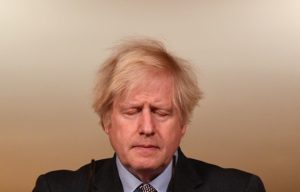It is surely not too early to write Boris Johnson’s political obituary; the wonder is that this has gone on so long, the great blond beast stumbling to his doom mortally wounded, like a mammoth studded with the spears of tiny hunters, without any of his circle yet willing to put him out of his misery. What a pathetic end this is, what a waste of his natural talent and heaven-sent good fortune, and what shameful squandering of a historic opportunity.
If Boris was, as his enemies proclaim, a Trumpian figure, it was only in the sense that he was an imperfect vessel for the revolutionary moment he was chosen to oversee. Like Trump, he was a metropolitan liberal who read the mood of the times and chose to play the role of tribune of the ignored, riding the anger of the forgotten as his vehicle to power. Like Trump, he was temperamentally unsuited to the needs of the hour: too lazy, too careless of detail, too distracted by his own personal and financial entanglements.
As with Trump, Johnson’s political foes, the liberal establishment he had betrayed, stymied his rule with all the stunts and tricks liberalism deploys to arrest democracy, here directly imported from the imperial metropole: the fictitious parallel institutions of liberal shadow governance such as Independent Sage, the same pointless, time-consuming lawfare of Twitter barristers calling themselves defenders of the rule of law, the same mass demonstrations of fevered identity warriors stoked by the opposition press for narrow political gain. No scandal was too petty, no wild accusation of fascism or dictatorial tendencies too overblown in the liberal para-state’s mission to save democracy from the voters.
For five and a half years we lived through the politics of crisis, a cold civil war in which the immediate triggers may have changed but the overarching antagonists remained the same. Boris was entrusted with the task of delivering Brexit against the opposition of the nation’s true government: the Westminster blob of bureaucrats, journalists and NGOs who ensure that, however people vote, nothing truly changes; the entire apparatus of the parallel state created by the union of New Labour legislation with a complacent and inept British establishment.
With democratic governance deadlocked by the wounded and vengeful establishment, Brexiteers were forced to choose having Brexit done at all over having it done well. To Johnson’s credit he delivered Brexit when it would have been easy not to, and he was at times willing enough to bend the rules to do so — Brexit was, after all, the result of the popular perception that the rules as they stand don’t work; that the British state functions far below its potential capacity; and the British nation is poorer, less safe and less happy than it ought to be. With a historic majority, at the helm of the country during its greatest moment of political change since Suez, Johnson had the potential to lead a radical reformist government and arrest the nation’s seemingly endless decline. Alas, the forces of inertia and dysfunction were too great.
The Dom and Boris partnership was the best chance of defeating the Westminster rigmarole machine, the source of the solipsistic froth and exhausted defeatism that passes for British governance. In blog after blog, and then in tweets written in the awkward textspeak of an eccentric uncle, Cummings has excoriated the failings of the civil service and the lobby courtiers in savage and convincing detail. And then, with all the bitter passion of a spurned partner, Cummings deployed the very same Westminster bubble he despises and pledged to destroy as his chosen tool to bring down his faithless master.
How absurd and trivial are the crimes for which Johnson is now being brought to bay; and yet his accusers, affecting outrage over his entourage sharing a packet of crisps, are the people who say they wish we were a serious country once again, taken seriously on the world stage. And all this from the very same blob which uses a British government trip to a Ukraine on the brink of invasion to ask about office parties, and forces Johnson to back out of a phone call with Putin to answer urgent questions about cakes. The jovial cavalier was finally unhorsed by thin-lipped puritans in a scandal so petty and meaningless it provokes only blank incomprehension and derision abroad.
Surely Johnson must now realise what a tremendous waste his period in office was: he could have repealed the entire corpus of New Labour legislation and reset the nation back to 1997 in search of a better path than the stagnation and social conflict that defines modern Britain. Johnson had the power and the mandate to dismantle the entire system of overproduction of embittered, indebted graduates from third-rate universities that spawns the party’s political enemies, and to overturn the legislation establishing the liberal shadow-government that frustrates effective Conservative governance. Like the conservative journalist he at heart remains, Johnson found it easier and more comfortable complaining about woke excess than identifying and dismantling the systems that nurture it. He could have done all this without facing any greater opposition than the press hysteria he already faced, or the affected outrage about crisps and sandwiches which has destroyed his career. What a waste of time it all was.
That such an opportunity could be squandered as the result of Downing Street domestic psychodrama is almost beyond comprehension. What a squalid betrayal, by both Johnson and Cummings, of the historic task they were entrusted with and of the voters who entrusted them with it. And how ironic that they both came to exemplify the failings of the governing class against which they proclaimed to rebel. In the end, Cummings looked too long into the rigmarole, and the rigmarole looked right back into him.
Britain’s political system is broken, and Johnson’s downfall by petty Covid rules highlights a central problem: it was easier for the Government to impose needless restrictions on people’s lives than to seize control of the machinery of the state to improve them, building the infrastructure and state capacity Britain lacks. Like the legislation against online speech which Johnson’s government is now inexplicably bringing in, or their funding of the NGO lobbies which hobble their governance, the Conservative government seems compelled to hand its political enemies the very weapons they will use against it. That Johnson was brought down by the petty restrictions he introduced may have a pleasing symmetry: that he laid his own head on the block for decapitation by the self-appointed Covid marshals of Labour’s tabloid press simply proves he was incapable of the task in front of him.
Johnson was incapable of delivering any reform in the face of hysterical opposition. Now we need a prime minister who can deliver a serious reformist program, and who can dismiss the lobby and the Blairite parallel state with the contempt it deserves.
None of the potential challengers so far fits this mould: Liz Truss and Rishi Sunak both promise a return to the zombie Thatcherism that vastly accelerated the state’s decline, and Tom Tugendhat is merely a neoconservative who has never yet seen a war he doesn’t wish Britain’s depleted armed forces to take part in — a foreign policy catastrophe waiting to happen.
As with Trump, the result may yet be that a more competent tribune, this time a true believer, will arise in time to finish the job. Johnson was, in many ways, a relic of the 2016 era of popular revolt against managerial liberalism and poor governance: the 2020s version will surely reflect the darkened mood of the decade. The background mood of economic stagnation, rising crime, deteriorating standards of living and sombre intimations of war is not favourable to a liberal renaissance. The difficult years we are heading into — perhaps a permanent downward trend — are of a kind likely to provoke a harder-edged conservative reaction than Johnson would ever have been capable of.
Just as the failure of the Trump administration has fostered the growth of a more serious and competent American Right in challengers such as Josh Hawley and Blake Masters, and Marine Le Pen’s series of electoral defeats in France has paved the way for the more radical Éric Zemmour, Johnson’s failure will perhaps lead to a more serious Right-wing challenger here in Britain, a Corbyn of the Right willing to remodel the state root and branch.
Perhaps, like the American Republicans, it will be necessary for the Conservatives to have some time on the Opposition benches to determine what they stand for, and what their vision of the Britain of the near future is. The general political and international situation is rapidly deteriorating — and the British state as it stands is incapable of meeting the demands of the times.
Disclaimer
Some of the posts we share are controversial and we do not necessarily agree with them in the whole extend. Sometimes we agree with the content or part of it but we do not agree with the narration or language. Nevertheless we find them somehow interesting, valuable and/or informative or we share them, because we strongly believe in freedom of speech, free press and journalism. We strongly encourage you to have a critical approach to all the content, do your own research and analysis to build your own opinion.
We would be glad to have your feedback.
Source: UnHerd Read the original article here: https://unherd.com




